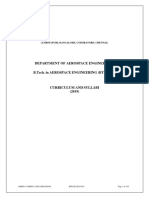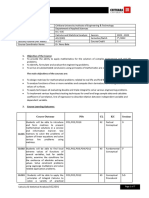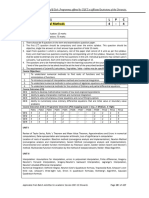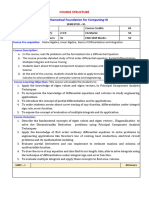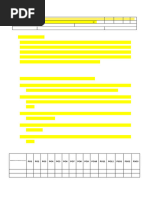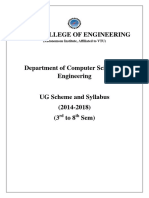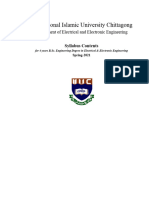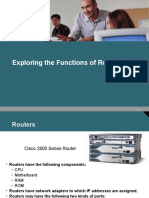NT Syllabus
Uploaded by
Abhishek KumarNT Syllabus
Uploaded by
Abhishek KumarDepartment of Computer Science and Engineering, GITAM Deemed to be University
L T P S J C
MATH2311 NUMBER THEORY 2 0 0 0 0 2
Pre-requisite None
Co- requisite None
Preferable Engineering and Science
exposure
Course Description:
This course is designed to explain the basics and applications of number theory for the students
of Computer Science. The core courses of these branches encounter with concepts like prime
factorization, modular arithmetic, and quadratic reciprocities in number theory. The first unit
of the course provide a strong platform for such encounters and the other units focuses on
applications of number theory.
Course Educational Objectives:
1. To teach basic concepts of number theory focusing on Computational aspects.
2. To teach the concepts of factorization of integers.
3. To teach Format’s theorem and quadratic residues.
4. To explain Chines remainder theorem and Euclidean algorithm.
5. To explain polynomial arithmetic.
UNIT 1 Basic Concepts in Number Theory 5 Hours
Topics in elementary number theory, Divisibility, Greatest Common Divisor, Euclidean
Algorithm
UNIT 2 5 Hours
Fundamental theorem of Arithmetic, Congruences, Properties of congruences, Linear
congruences
UNIT 3 5 Hours
Fermat's theorem, Fermat's little theorem, Wilson’s theorem
UNIT 4 5 Hours
Chinese remainder theorem, The functions 𝜏𝜏 𝑎𝑎𝑎𝑎𝑎𝑎 𝜎𝜎, Euler Phi-function, Euler’s theorem,
Some properties of phi function
UNIT 5 5 Hours
The order of integer modulo n, Primitive roots for prime, Composite number having
primitive roots
B Tech. Computer Science and Engineering w.e.f. 2021-22 admitted batch
Department of Computer Science and Engineering, GITAM Deemed to be University
Textbooks:
1. Elementary Number Theory | 7th Edition by David Burton, Mc Graw Hill Education
References:
1. Basic Number Theory by S.B. Malik,S. Chand publishers
Course Outcomes:
Upon successful completion of this course the student should be able to
1. Apply concepts of number theory focusing on Computational aspects.
2. Analyze concepts of factorization of integers.
3. Explain Fermat’s theorem and quadratic residues.
4. Analyse Chines remainder theorem and Euclidean algorithm.
5. Analyse the concept of polynomial arithmetic.
CO-PO Mapping:
PO1 PO2 PO3 PO4 PO5 PO6 PO7 PO8 PO9 PO10 PO11 PO12 PSO1 PSO2 PSO3
CO1 2 1 1 1 1 1 1 1 1 1 1 1 2 1 1
CO2 2 1 1 1 1 1 1 1 1 1 1 1 2 1 1
CO3 2 1 1 1 1 1 1 1 1 1 1 1 2 1 1
CO4 2 1 1 1 1 1 1 1 1 1 1 1 2 1 1
CO5 2 1 1 1 1 1 1 1 1 1 1 1 2 1 1
Note: 1 - Low Correlation 2 - Medium Correlation 3 - High Correlation
APPROVED IN:
BOS : 26-04-2021 ACADEMIC COUNCIL: 17-09-2021
SDG No. & Statement: 4
Ensure inclusive and equitable quality education and promote lifelong opportunities for
all.
SDG Justification:
Learning of various mathematical techniques will lead to knowledge of applications in
Engineering problems
B Tech. Computer Science and Engineering w.e.f. 2021-22 admitted batch
You might also like
- Hourglass Workout Program by Luisagiuliet 276% (21)Hourglass Workout Program by Luisagiuliet 251 pages
- The Hold Me Tight Workbook - Dr. Sue Johnson100% (16)The Hold Me Tight Workbook - Dr. Sue Johnson187 pages
- Read People Like A Book by Patrick King-Edited62% (66)Read People Like A Book by Patrick King-Edited12 pages
- Livingood, Blake - Livingood Daily Your 21-Day Guide To Experience Real Health77% (13)Livingood, Blake - Livingood Daily Your 21-Day Guide To Experience Real Health260 pages
- COSMIC CONSCIOUSNESS OF HUMANITY - PROBLEMS OF NEW COSMOGONY (V.P.Kaznacheev,. Л. V. Trofimov.)94% (212)COSMIC CONSCIOUSNESS OF HUMANITY - PROBLEMS OF NEW COSMOGONY (V.P.Kaznacheev,. Л. V. Trofimov.)212 pages
- Donald Trump & Jeffrey Epstein Rape Lawsuit and Affidavits83% (1016)Donald Trump & Jeffrey Epstein Rape Lawsuit and Affidavits13 pages
- The 36 Questions That Lead To Love - The New York Times94% (34)The 36 Questions That Lead To Love - The New York Times3 pages
- The 36 Questions That Lead To Love - The New York Times95% (21)The 36 Questions That Lead To Love - The New York Times3 pages
- Jeffrey Epstein39s Little Black Book Unredacted PDF75% (12)Jeffrey Epstein39s Little Black Book Unredacted PDF95 pages
- The 4 Hour Workweek, Expanded and Updated by Timothy Ferriss - Excerpt23% (954)The 4 Hour Workweek, Expanded and Updated by Timothy Ferriss - Excerpt38 pages
- Excel File CO-PO Attainment For UG - RACNo ratings yetExcel File CO-PO Attainment For UG - RAC13 pages
- Corrig e TD5: Lelong J Er Ome 3 Janvier 2006No ratings yetCorrig e TD5: Lelong J Er Ome 3 Janvier 20065 pages
- MT4012-Complex Analysis and Numerical MethodsNo ratings yetMT4012-Complex Analysis and Numerical Methods5 pages
- 5. CSE_FY BTech _Syllabus_AY 23-24 Updated_compressedNo ratings yet5. CSE_FY BTech _Syllabus_AY 23-24 Updated_compressed60 pages
- SY-CSE-AY-2022-23-Syllabus - Updatged - CO - PONo ratings yetSY-CSE-AY-2022-23-Syllabus - Updatged - CO - PO44 pages
- Course outline-MATH-232- Complex Variables Transforms (BEE-15ABC)No ratings yetCourse outline-MATH-232- Complex Variables Transforms (BEE-15ABC)4 pages
- University of Kerala: Syllabus FOR Semester Iii&IvNo ratings yetUniversity of Kerala: Syllabus FOR Semester Iii&Iv199 pages
- Attachment Circular 2023081114090722 As 001No ratings yetAttachment Circular 2023081114090722 As 0017 pages
- Computer Science and Engineering - 2019 Scheme s4 Syllabus - Ktustudents - inNo ratings yetComputer Science and Engineering - 2019 Scheme s4 Syllabus - Ktustudents - in153 pages
- Detail Syllabus Course Booklet B.Tech 1st YearNo ratings yetDetail Syllabus Course Booklet B.Tech 1st Year50 pages
- 2.1.1 Discrete Mathematics ^0 Graph TheoryNo ratings yet2.1.1 Discrete Mathematics ^0 Graph Theory3 pages
- Course Description Form: Marks DistributionNo ratings yetCourse Description Form: Marks Distribution6 pages
- Connected Crawler Robot - Design and Motion Planning For Climbing A StepNo ratings yetConnected Crawler Robot - Design and Motion Planning For Climbing A Step15 pages
- Accounting, Accountability, Social Media and Big Data - Revolution or Hype PDFNo ratings yetAccounting, Accountability, Social Media and Big Data - Revolution or Hype PDF17 pages
- Sbi Po & Ibps Po Mains Day - 28 e 169788874118No ratings yetSbi Po & Ibps Po Mains Day - 28 e 16978887411840 pages
- West Hollywood Chamber of Commerce Newsletter Fall 2010No ratings yetWest Hollywood Chamber of Commerce Newsletter Fall 201016 pages
- 3.0.1.2 How Much Does This Cost Instructions WBNo ratings yet3.0.1.2 How Much Does This Cost Instructions WB2 pages
- CISA Certified Information Systems Auditor Study Guide 4th Edition by David Cannon, Brian O'Hara, Allen Keele ISBN 1421549298 9781119056249 - Quickly download the ebook to never miss any contentNo ratings yetCISA Certified Information Systems Auditor Study Guide 4th Edition by David Cannon, Brian O'Hara, Allen Keele ISBN 1421549298 9781119056249 - Quickly download the ebook to never miss any content53 pages




















































